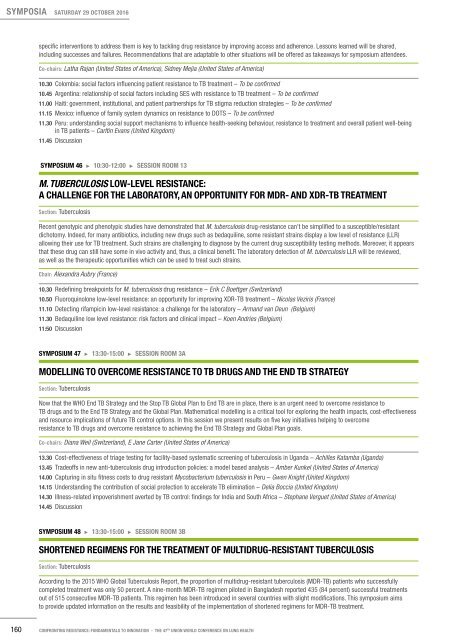TO INNOVATIONS
2f3gIP7
2f3gIP7
Create successful ePaper yourself
Turn your PDF publications into a flip-book with our unique Google optimized e-Paper software.
SYMPOSIA SATURDAY 29 OC<strong>TO</strong>BER 2016<br />
specific interventions to address them is key to tackling drug resistance by improving access and adherence. Lessons learned will be shared,<br />
including successes and failures. Recommendations that are adaptable to other situations will be offered as takeaways for symposium attendees.<br />
Co-chairs: Latha Rajan (United States of America), Sidney Mejia (United States of America)<br />
10.30 Colombia: social factors influencing patient resistance to TB treatment – To be confirmed<br />
10.45 Argentina: relationship of social factors including SES with resistance to TB treatment – To be confirmed<br />
11.00 Haiti: government, institutional, and patient partnerships for TB stigma reduction strategies – To be confirmed<br />
11.15 Mexico: influence of family system dynamics on resistance to DOTS – To be confirmed<br />
11.30 Peru: understanding social support mechanisms to influence health-seeking behaviour, resistance to treatment and overall patient well-being<br />
in TB patients – Carltin Evans (United Kingdom)<br />
11.45 Discussion<br />
SYMPOSIUM 46 3 10:30-12:00 3 SESSION ROOM 13<br />
M. TUBERCULOSIS LOW-LEVEL RESISTANCE:<br />
A CHALLENGE FOR THE LABORA<strong>TO</strong>RY, AN OPPORTUNITY FOR MDR- AND XDR-TB TREATMENT<br />
Section: Tuberculosis<br />
Recent genotypic and phenotypic studies have demonstrated that M. tuberculosis drug-resistance can’t be simplified to a susceptible/resistant<br />
dichotomy. Indeed, for many antibiotics, including new drugs such as bedaquiline, some resistant strains display a low level of resistance (LLR)<br />
allowing their use for TB treatment. Such strains are challenging to diagnose by the current drug susceptibility testing methods. Moreover, it appears<br />
that these drug can still have some in vivo activity and, thus, a clinical benefit. The laboratory detection of M. tuberculosis LLR will be reviewed,<br />
as well as the therapeutic opportunities which can be used to treat such strains.<br />
Chair: Alexandra Aubry (France)<br />
10.30 Redefining breakpoints for M. tuberculosis drug resistance – Erik C Boettger (Switzerland)<br />
10.50 Fluoroquinolone low-level resistance: an opportunity for improving XDR-TB treatment – Nicolas Veziris (France)<br />
11.10 Detecting rifampicin low-level resistance: a challenge for the laboratory – Armand van Deun (Belgium)<br />
11.30 Bedaquiline low level resistance: risk factors and clinical impact – Koen Andries (Belgium)<br />
11:50 Discussion<br />
SYMPOSIUM 47 3 13:30-15:00 3 SESSION ROOM 3A<br />
MODELLING <strong>TO</strong> OVERCOME RESISTANCE <strong>TO</strong> TB DRUGS AND THE END TB STRATEGY<br />
Section: Tuberculosis<br />
Now that the WHO End TB Strategy and the Stop TB Global Plan to End TB are in place, there is an urgent need to overcome resistance to<br />
TB drugs and to the End TB Strategy and the Global Plan. Mathematical modelling is a critical tool for exploring the health impacts, cost-effectiveness<br />
and resource implications of future TB control options. In this session we present results on five key initiatives helping to overcome<br />
resistance to TB drugs and overcome resistance to achieving the End TB Strategy and Global Plan goals.<br />
Co-chairs: Diana Weil (Switzerland), E Jane Carter (United States of America)<br />
13.30 Cost-effectiveness of triage testing for facility-based systematic screening of tuberculosis in Uganda – Achilles Katamba (Uganda)<br />
13.45 Tradeoffs in new anti-tuberculosis drug introduction policies: a model based analysis – Amber Kunkel (United States of America)<br />
14.00 Capturing in situ fitness costs to drug resistant Mycobacterium tuberculosis in Peru – Gwen Knight (United Kingdom)<br />
14.15 Understanding the contribution of social protection to accelerate TB elimination – Delia Boccia (United Kingdom)<br />
14.30 Illness-related impoverishment averted by TB control: findings for India and South Africa – Stephane Verguet (United States of America)<br />
14.45 Discussion<br />
SYMPOSIUM 48 3 13:30-15:00 3 SESSION ROOM 3B<br />
SHORTENED REGIMENS FOR THE TREATMENT OF MULTIDRUG-RESISTANT TUBERCULOSIS<br />
Section: Tuberculosis<br />
According to the 2015 WHO Global Tuberculosis Report, the proportion of multidrug-resistant tuberculosis (MDR-TB) patients who successfully<br />
completed treatment was only 50 percent. A nine-month MDR-TB regimen piloted in Bangladesh reported 435 (84 percent) successful treatments<br />
out of 515 consecutive MDR-TB patients. This regimen has been introduced in several countries with slight modifications. This symposium aims<br />
to provide updated information on the results and feasibility of the implementation of shortened regimens for MDR-TB treatment.<br />
160 CONFRONTING RESISTANCE: FUNDAMENTALS <strong>TO</strong> INNOVATION - THE 47 TH UNION WORLD CONFERENCE ON LUNG HEALTH


